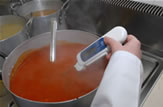Food Sampling
 The Food Safety Section takes samples of food from shops, catering premises and manufacturers throughout Aberdeenshire in order to monitor the safety and quality of food offered for sale and to take action when public health may be at risk.
The Food Safety Section takes samples of food from shops, catering premises and manufacturers throughout Aberdeenshire in order to monitor the safety and quality of food offered for sale and to take action when public health may be at risk.
Food sampling provides a valuable means of surveillance to ensure that food safety and hygiene standards are monitored in accordance with current food law. It also proves to be an effective method of promoting food safety and can highlight problems, which, if not identified and resolved, may easily result in serious food poisoning outbreaks.
The majority of samples obtained are informal. Informal sampling is mainly a surveillance exercise where samples of the final product are either purchased anonymously or by agreement with food business operators. No formal action can be taken if informal samples are found to be unsatisfactory. Where informal sampling reveals a problem it will be followed up either by giving advice to the food proprietor and re-sampling informally or by sampling formally.
Formal sampling can result in legal action being taken.
The purpose of food sampling is to:
- Identify foods that could pose a hazard to the consumer by the presence of harmful bacteria and/or toxic chemicals.
- Assess the microbiological quality of food manufactured or retailed in and distributed outwith Aberdeenshire.
- Assess the legal requirements covering the quality, composition, labelling, presentation and advertising of food.
- Assist in the investigation of consumer complaints.
- Assist in the investigation of food poisoning outbreaks.
A sampling programme is produced every year in agreement with the Aberdeen Scientific Services Laboratory.
The type of foods sampled is primarily targeted at classes of products considered the most risk to consumers produced locally for local consumption or for distribution outwith Aberdeenshire. Whenever possible sampling is carried out in accordance with local, regional and national surveys, projects and/or investigations initiated by local trends or by regional and national bodies such as the North of Scotland Food Liaison Group, the Scottish Food Enforcement Liaison Committee and Food Standards Scotland.
In addition, the general monitoring sampling programme includes routine surface swabbing of food preparation surfaces and equipment.
